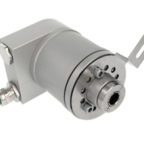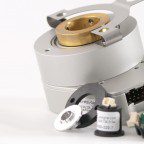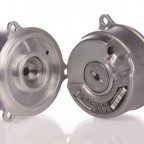By Christian Fell, POSITAL-FRABA Inc. | The automotive industry is a place of constant change as car-makers work hard to respond to evolving customer preferences and new regulatory requirements. Not only must car makers constantly refresh their models lines, they must also be constantly upgrading their production facilities to optimize productivity and product quality.
When a major U.S. automaker set out to re-tool one of their Michigan engine plants for a new production program, they also recognized the need to update a significant part of the automation system that controlled equipment on the shop floor.
The automaker hired DataRealm Inc., a Windsor, Ontario-based system integrator, to study the issue and to design and implement a new solution. The project taken on by DataRealm included new IT interfaces, new PLCs, updated human-machine interfaces (HMI), new data communications networks and upgrades to sensors and actuators.
The system integrator was also responsible for device programming, quality and traceability.
Generational change in control system technology
During an earlier reconfiguration, this plant had been equipped with what were (at that time) state-of-the-art components.
To ensure that PLCs could be located close to the machinery they were intended to control, even when there were no protective cabinets nearby, special units with water and dust-proof IP67-rated housings had been selected.
Communications between controllers and the sensors and actuators located throughout the plant was through a proprietary networking system. When it came time to upgrade the plant, the system integrators found that meeting the requirements of the new production program would require more powerful PLCs. Moreover, the older networking technology was no longer supported and would need to be replaced.
The plant upgrade proceeded in several phases. For the first stage (2008-10) new IP67-rated PLCs from Phoenix Contact were installed, along with an INTERBUS fieldbus network. These changes solved the immediate problems of underpowered controllers and the obsolete networking technology.
A second phase, currently underway, will involve further upgrades, including the installation of a PROFINET data communications network. PROFINET, a form of industrial Ethernet, will enhance the ability of the system to support a virtually unlimited number of ‘smart’ devices (sensors, actuators, and so forth) throughout the plant. It will also provide an interface to higher level manufacturing management systems.
Encoders that fit the job
When it came to selecting rotary encoders for the system, DataRealm’s selection criteria were accuracy, reliability, compatibility with the upgraded communications networks, environmental protection to IP67 level or better and a compact form factor that would facilitate installation on existing machinery. Vendor responsiveness was also important. More after the jump.
Unlike routine equipment maintenance operations, which can often be accommodated between working shifts, full system upgrades require complete plant shutdowns. To minimize the length of the shutdown, and associated lost production, DataRealm had to find supplier who could meet tight delivery schedules.
DataRealm found what they needed in the POSITAL IXARC line of absolute rotary encoders.
“POSITAL were very easy to work with on this project,” said Dave Fortin, President of DataRealm. “They had products that met our specs and were prepared to supply special adaptor plates that simplified our task when it came to swapping out the old sensors. They were also able to deliver what we needed on time and on spec.”
The availability of POSITAL encoders with both INTERBUS and PROFINET communication interfaces was another advantage.
The plant is successfully up and running with the new production program and the supporting automation system. In fact, it has emerged as the most productive plant of its type in the company.









Leave a Reply
You must be logged in to post a comment.